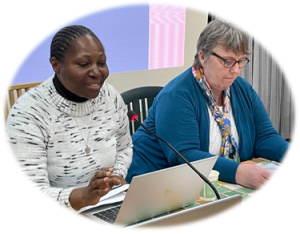
Many of our monastic communities are living challenging times with the ageing of their members, the lack of vocations, the socio-economic consequences of the pandemic, climate change, etc., and they have to make complex decisions based on their present and near future.
In this context, we also received a renewed call from Pope Francis to use the tradition and wisdom from the concept of synodality, in which everyone is invited to listen and to be heard.
When we think of synodality in Benedictine terms, Chapter 3 of the Rule of Saint Benedict immediately comes to mind, in which everyone is called to council, including the youngest members. However, faced with complex decisions with strong consequences for our communities, we often ask ourselves if we are a monarchy or a democracy, and the same monastic tradition reminds us that we are neither one nor the other, but rather a theocracy, theocracy understood as the community that seeks together the will of God and its concrete realization in their lives.
How then can we harmonize synodality with theocracy to seek God’s will and its fulfilment in our communities according to the Benedictine tradition?
Once again, the Benedictine monastic tradition bequeaths us a precious instrument, namely shared Lectio divina! Do we make use of this instrument? So, I propose this possibility based on the biblical reading of the account of the Disciples of Emmaus (Luke 24.13-35):
Now that very same day, two of them were on their way to a village called Emmaus, seven miles from Jerusalem, and they were talking together about all that had happened.
In the paths and in the history of salvation of our communities, do we talk about everything that happens, whether they be moments of doubt and pain or happiness and joy? It is worth remembering that when I share a pain, it is divided, and that when I share joy, it is multiplied.
And it happened that as they were talking together and discussing it, Jesus himself came up and walked by their side, but their eyes were prevented from recognising him.
Where two or more are gathered in his name, that is, in shared Lectio divina, will not Jesus walk in their midst? Even if we sometimes fail to recognize him because of our aridity, he is there!
He said to them, ‘What are all these things that you are discussing as you walk along?’ They stopped, their faces downcast. Then one of them, called Cleopas, answered him, ‘You must be the only person staying in Jerusalem who does not know the things that have been happening there these last few days.’
Sometimes we start Lectio divina sad, but through his Word, Jesus does not stop questioning us and looking for the reason for our sadness. Do I have this perseverance in seeking God?
He asked, ‘What things?’ They answered, ‘All about Jesus of Nazareth, who showed himself a prophet powerful in action and speech before God and the whole people; and how our chief priests and our leaders handed him over to be sentenced to death and had him crucified. Our own hope had been that he would be the one to set Israel free. And this is not all: two whole days have now gone by since it all happened; and some women from our group have astounded us: they went to the tomb in the early morning, and when they could not find the body, they came back to tell us they had seen a vision of angels who declared he was alive. Some of our friends went to the tomb and found everything exactly as the women had reported, but of him they saw nothing.’
In Lectio divina, do we not constantly encounter the passion, death, and resurrection of Jesus? And in the same Lectio, will we not find the meaning of the passion, death, and resurrection of our communities’? ‘I know it’s Easter because I deserved the j oy of seeing you,’ said St Benedict to the priest who found him in Subiaco to celebrate Easter with him (Second Book of Dialogues, Chapter 1).
Then he said to them, ‘You foolish men! So slow to believe all that the prophets have said! Was it not necessary that the Christ should suffer before entering into his glory?’ Then, starting with Moses and going through all the prophets, he explained to them the passages throughout the scriptures that were about himself.
Consequently, in Lectio divina, does not Jesus testify to us about his and our history of salvation? However, to have this ‘intelligence’ I mean, to do this ‘divine reading’ of events based on the Holy Scriptures, I always need to ask for the help of the Holy Spirit.
When they drew near to the village to which they were going, he made as if to go on; but they pressed him to stay with them saying, ‘It is nearly evening, and the day is almost over.’ So, he went in to stay with them. Now while he was with them at table, he took the bread and said the blessing; then he broke it and handed it to them. And their eyes were opened and they recognised him; but he had vanished from their sight.
Sharing the ‘Table of the Word,’ the ambo, and sharing the ‘Table of Bread,’ the altar, do we not recognize who Jesus is? And in his shared Word does he not ‘abide’ with us?
Then they said to each other, ‘Did not our hearts burn within us as he talked to us on the road and explained the scriptures to us?’ They set out that instant and returned to Jerusalem. There they found the Eleven assembled together with their companions,
Does the Lectio divina shared at these ‘tables’ not set our hearts on fire? Does it not transform sadness into joy and lack of meaning into hope?
Does shared Lectio divina not direct us to the heavenly Jerusalem, the City of Peace, where God’s will for us is fulfilled?
Does not St. Benedict ask us ‘what page, in fact, or what word of divine authority in the Old and New Testaments is not a very exact norm of human life’? (RB 73.3)
… who said to them, ‘The Tord has indeed risen and has appeared to Simon.’ Then they told their story of what had happened on the road and how they had recognised him at the breaking of bread.
Does shared Lectio divina lead us to rise again with Jesus?
Would it not also be the way of resurrection for our communities?
In shared Lectio, do we not witness the encounter with Jesus and the discernment of the will of God the Father through the Holy Spirit?
Isn’t this the meaning of ‘Suscipe me’ in our communities: ‘Receive me, Lord, according to your word, and I will live, and do not confound me in my hopes’ (Psalm 118.116)?
Lord, sharing Your Word, we recognize You in the bread and in our history of salvation.
Amen.
(Ref: Alliance for International Monasticism, No.122, 2022, pp. 7-11)



